|
Books Should Be Free Loyal Books Free Public Domain Audiobooks & eBook Downloads |
|
|
Books Should Be Free Loyal Books Free Public Domain Audiobooks & eBook Downloads |
|
Top Authors |
|---|
|
Book type:
Sort by:
|
By: Aristotle (384-322 BCE) | |
|---|---|
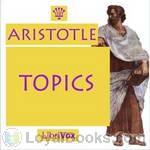 Topics
Topics
The Topics is is the fifth of Aristotle's six texts on logic which are collectively known as the Organon ("Instrument"). The Topics constitutes Aristotle's treatise on the art of dialectic—the invention and discovery of arguments in which the propositions rest upon commonly-held opinions or endoxa. Topoi are "places" from which such arguments can be discovered or invented. In his treatise on the Topics, Aristotle does not explicitly define a topos, though it is "at least primarily a strategy for argument not infrequently justified or explained by a principle." | |
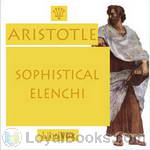 Sophistical Elenchi
Sophistical Elenchi
De Sophisticis Elenchis is the sixth of Aristotle's six texts on logic which are collectively known as the Organon ("Instrument"). In De Sophisticis Elenchis Aristotle identifies 13 falacies. Verbal Fallacies are: Accent or Emphasis; Amphibology; Equivocation; Composition; Division and Figure of Speech. Material Fallacies are: Accident; Affirming the Consequent; Converse Accident; Irrelevant Conclusion; Begging the Question; False Cause and Fallacy of Many Questions. | |
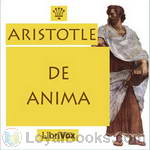 De Anima
De Anima
On the Soul (Greek Περὶ Ψυχῆς (Perì Psūchês), Latin De Anima) is a major treatise by Aristotle on the nature of living things. His discussion centres on the kinds of souls possessed by different kinds of living things, distinguished by their different operations. Thus plants have the capacity for nourishment and reproduction, the minimum that must be possessed by any kind of living organism. Lower animals have, in addition, the powers of sense-perception and self-motion (action). Humans have all these as well as intellect... | |
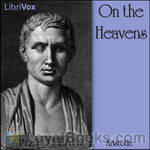 On the Heavens
On the Heavens
On the Heavens (Greek: Περί ουρανού, Latin: De Caelo or De Caelo et Mundo) is Aristotle's chief cosmological treatise. In it Aristotle argues that the Earth is a sphere by pointing to the evidence of lunar eclipses. Aristotle also provides a detailed explanation of his theory of 'gravity' arguing that things which contain 'earth' fall towards the centre of the Universe because 'earth' is naturally attracted to the centre of the Universe. Aristotle argues that if the planet Earth was moved to the location of the Moon then objects which contain 'earth' would not fall towards the centre of the Earth but rather towards the centre of the Universe... | |
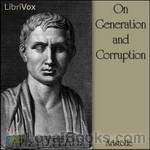 On Generation and Corruption
On Generation and Corruption
On Generation and Corruption (Ancient Greek: Περὶ γενέσεως καὶ φθορᾶς, Latin: De Generatione et Corruptione, also known as On Coming to Be and Passing Away) is a treatise by Aristotle. Like many of his texts, it is both scientific and philosophic (although not necessarily scientific in the modern sense). The philosophy, though, is essentially empirical; as in all Aristotle's works, the deductions made about the unexperienced and unobservable are based on observations and real experiences... | |
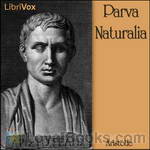 Parva Naturalia
Parva Naturalia
Parva Naturalia [the "short treatises on nature" (a conventional Latin title first used by Giles of Rome)] is a collection of books by Aristotle, which discuss natural phenomena involving the body and the soul. The books are as follows:I - On Sensation and the SensibleII - On Memory and RecollectionIII - On Sleeping and WakingIV - On DreamsV - On Prophecy in SleepVI - On Longevity and Shortness of LifeVII - On Youth and Old Age, Life and Death VIII - On Respiration | |
 Meteorology, On the Universe & On Breath
Meteorology, On the Universe & On Breath
Meteorology by Aristotle Translated by Erwin Wentworth Webster before he fell in action in 1917. Book I: The Celestial Sphere, Stars & Precipitation Book II: Seas, Winds & Earthquakes Book III: Halos, Rainbows & Mock Suns Book IV: The Elements & Secondary Qualities On the Universe is attributed to Aristotle but may have been written by Posidonius the Stoic or someone well acquainted with his work. Two candidates for the Alexander addressed in the text are Alexander the Great and Tiberius Claudius Alexander, nephew of Philo Judaeus and Procurator of Judaea, and in A... | |
 Opuscula
Opuscula
Opuscula is a collection of shorter books that may or may not have been written by Aristotle. 1. On Colours 2. On Things Heard 3. Physiognomonics 4. On Plants 5. On Marvellous Things Heard 6. Mechanics 7. On Indivisible Lines 8. The Situations and Names of Winds 9. On Melissus, Xenophanes, and Gorgias - Summary by Geoffrey Edwards | |
 On the Parts of Animals
On the Parts of Animals
On the Parts of Animals by Aristotle . The first book asks whether animals were designed or came into existence by chance. The remaining three books focus on particular examples of various animals and the functions of their organs. The translator William Ogle, who was both a medical doctor and classicist, presented Charles Darwin with a copy of this translation. | |
 History of Animals
History of Animals
Book I Grouping of animals and the parts of the human body. Book II Different parts of red-blooded animals. Book III Internal organs. Book IV Animals without blood . Books V & VI Animal reproduction. Book VII Human reproduction. Book VIII Habits . Book IX Social behavior. Book X Dealing with barrenness in women was excluded from the translation of D'Arcy Thompson for being spurious so the translation of the Clergyman Richard Cresswell is used instead. Sir D'Arcy Wentworth Thompson was a biologist, mathematician and classicist who also wrote On Growth and Form which discusses the mathematical patterns and structures formed in plants and animals. | |
 Movement & Progression of Animals
Movement & Progression of Animals
Movement of Animals begins with a discussion of the physics of motion and asks whether God, the Unmoved Mover, exists outside of our Universe. Progression of Animals asks why animals have the parts they do and to what end these parts are possessed. - Summary by Geoffrey Edwards | |
 Generation of Animals
Generation of Animals
Generation of Animals ; Latin: De Generatione Animalium) Book 1: Sexual Parts, Semen & Sexual Generation Book 2: Sexes, Embryo Development & Sterility Book 3: Birds, Fish, Cephalopods, Insects, Bees & Testacea Book 4: Causes of Sex, Heredity & Teratology Book 5: Distinction between Necessity and the Final Cause Charles Darwin wrote: "Linnaeus and Cuvier have been my two gods, though in very different ways, but they were mere schoolboys to old Aristotle." - Summary by Geoffrey Edwards | |
By: Arlo Bates (1850-1918) | |
|---|---|
 Intoxicated Ghost And Other Stories
Intoxicated Ghost And Other Stories
A charming collection of short stories, dealing with ghosts, magic, and other-worldly events that even the faint of heart will enjoy. 1. The Intoxicated Ghost - a woman tries to outsmart a ghost to save the family from financial ruin. 2. A Problem In Portraiture - can a man's portrait influence the man he becomes? 3. Knitters In The Sun - will a father's curse keep two lovers apart? 4. A Comedy In Crape - the death of the town playboy causes a dispute over who is entitled to be chief mourner 5. A Meeting Of The Psychical Club - who is the hooded stranger, and are his powers real? 6... | |
By: Armando Palacio Valdés (1853-1938) | |
|---|---|
 Christmas Stories from French and Spanish Writers
Christmas Stories from French and Spanish Writers
Fifteen short stories by Antoinette Ogden from French and Spanish writers of many times. | |
By: Armen Garo (1872-1923) | |
|---|---|
 Why Armenia Should Be Free: Armenia's Role in the Present War
Why Armenia Should Be Free: Armenia's Role in the Present War
Here is a trenchant argument for the Allied Supreme Council, established at the close of World War One, to recognize and defend the independence of Armenia and its people. Responding to President Wilson's call for the sovereignty of those who fought for self-determination during the war, the author outlines his people's suffering and their efforts to earn recognition of their nationhood by joining the Entente in fighting against tyranny. | |
By: Armin Stein (1840-1929) | |
|---|---|
 Katharine von Bora: Dr. Martin Luther's Wife
Katharine von Bora: Dr. Martin Luther's Wife
This is a fictionalized biography of the wife of the reformer Dr. Martin Luther. In the author's words, he hopes that "people may learn to know the wife of its greatest man,—not by name only, but as her husband's 'helpmeet,' in the truest sense of the word, as a pattern of domestic virtue, and as a pearl among women." - Summary by Dory Smith | |
By: Arnold Bennett (1867-1931) | |
|---|---|
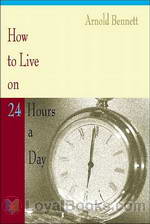 How to Live on Twenty-Four Hours a Day
How to Live on Twenty-Four Hours a Day
This book is a classic piece on self improvement teaching you to live to the fullest. Judging from the title of the book, the reader might expect that the book is a manual on how to manage your time better. Nothing could be further from the truth, this book is a flowery and witty self help book aimed at helping readers improve the quality of their lives, in fact it is one of the firsts of its kind in the world. Bennett describes the twenty four hours in a day as a miracle and that it should be used for the betterment of health, wealth, respect, pleasure and contentment... | |
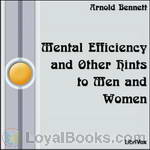 Mental Efficiency and Other Hints to Men and Women
Mental Efficiency and Other Hints to Men and Women
Mental Efficiency and Other Hints to Men and Women is one of the many self help books that Bennett wrote, the most famous of these being How to Live 24 Hours a Day. It is highly readable, amusing and offers wisdom in an extremely palatable form. Bennett's gift for analysis and his knowledge of philosophy and psychology make this book a valuable treasure trove of handy hints to improve our lives. Though it was first published in 1911, it remains as relevant, wise and useful as it did more than a hundred years ago... | |
 The Card
The Card
The ‘Card’ in question is Edward Henry Machin – his mother called him ‘Denry.’This light-hearted story is of his rise from humble beginnings as the son of a washerwoman and sempstress in the last quarter of the nineteenth century, in the pottery towns (which Arnold Bennett christened ‘The Five Towns’) of the English Midlands; how, by his own wits, enterprise and ‘nerve’ he rose to wealth, married bliss and public recognition as the youngest-ever mayor of his home town. “’And yet,’ demanded Councillor Barlow, ‘what’s he done? What great cause is he identified with?’‘He’s identified,’ said the speaker, ‘with the great cause of cheering us all up’.” | |
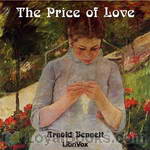 The Price of Love
The Price of Love
Rachel Louise Fleckring works for the elderly Mrs Maldon, and although with the woman for only a short time, she is taken into the heart of the family. She falls in love with one of Mrs Maldon’s descendents, but along the way, she has to come to terms with the fact that he isn’t, perhaps, the perfectly honest man she thought he was. | |
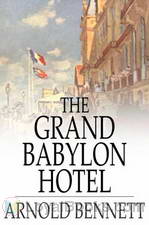 The Grand Babylon Hotel
The Grand Babylon Hotel
Theodore Racksole, a rich American multi-millionaire, buys the Grand Babylon Hotel, a luxurious hotel in London, as a whim – and then finds out there are strange things going on – a German prince is supposed to arrive but never turns up, someone is found murdered in the hotel, but then the body disappears. With the help of his independent daughter Nella and another German prince, Racksole sets out to solve the mystery.Bennett wrote this as a 15-part serial, for a lark, in 15 days, and sold it for 100 pounds. It first appeared in The Golden Penny in 1902, which described it as “the most original, amusing, and thrilling serial written in a decade”. | |
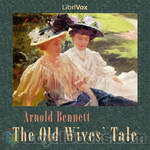 The Old Wives' Tale
The Old Wives' Tale
The Old Wives’ Tale is a novel by Arnold Bennett, first published in 1908. It deals with the lives of two very different sisters, Constance and Sophia Baines, following their stories from their youth, working in their mother’s draper’s shop, into old age. It is generally regarded as one of Bennett’s finest works. It covers a period of about 70 years from roughly 1840 to 1905, and is set in Burslem and Paris. | |
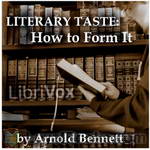 Literary Taste: How to Form It
Literary Taste: How to Form It
Arnold Bennett describes a method for enjoying literature, and suggests the contents of a comprehensive library. Chapters 1-10 and 14 describe his method for learning to enjoy literature. Chapters 11, 12, and 13 contain detailed lists of the 337 volumes required to complete a comprehensive library of English works. This reading is from the 1913 version at Project Gutenberg, and so does not contain the revisions made by Swinnerton for the 1939 edition, which included authors of the early Twentieth Century. Swinnerton’s revisions are available from Wikipedia. | |
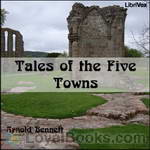 Tales of the Five Towns
Tales of the Five Towns
This is a selection of short stories recounting, with gentle satire and tolerant good humour, the small town provincial life at the end of the nineteenth century, based around the six towns in the county of Staffordshire, England, known as the Potteries. Arnold Bennett chose to fictionalize these towns by changing their names and omitting one (Fenton) as he apparently felt that “Five Towns” was more euphonious than “Six Towns”. The real town names which are thinly disguised in the novel are: Hanley, Longton, Burslem and Tunstal, the fifth, Stoke became “Knype”... | |
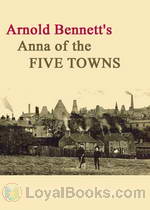 Anna of the Five Towns
Anna of the Five Towns
The plot centers on Anna Tellwright, daughter of a wealthy but miserly and dictatorial father, living in the Potteries area of Staffordshire, England. Her activities are strictly controlled by the Methodist church. Having escaped her father by marrying the respectable and attractive Henry, she attempts in vain to help Willy, son of a drunken and bankrupt business associate of her father's. | |
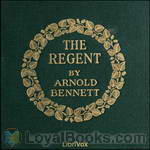 The Regent
The Regent
'The Regent' is, if not a sequel to 'The Card', then a 'Further Adventures of' the eponymous hero of that novel.Denry Machin is now forty-three and begins to feel that he is getting old, that making money and a happy home life are not enough and that he has lost his touch as the entrepreneur and entertainer of the 'Five Towns'.In fact, as he says to himself 'What I want is change - and a lot of it too!'. A chance meeting at the local theatre leads to his going to London and then... | |
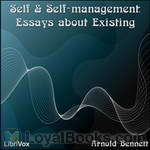 Self and Self-management: Essays about Existing
Self and Self-management: Essays about Existing
Bennett's essays always provide food for thought and bring a wry smile to the lips. Human nature, it appears, changes little over the ages, and Bennett's writing stands the test of time, though in the case of some of the essays in this eclectic collection, it is well to remember that they were written at the time of the First World War and the fight for women's suffrage. | |
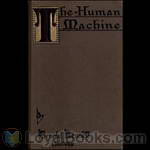 The Human Machine
The Human Machine
Bennett asks us to consider our brains as the most wonderful machine, a machine which is the only thing in this world that we can control. As he writes: "I am simply bent on calling your attention to a fact which has perhaps wholly or partially escaped you -- namely, that you are the most fascinating bit of machinery that ever was."As ever, his prose is honeyed, his thoughts inspired, and his advice as relevant today as when it was written. (Introduction by Ruth Golding) | |
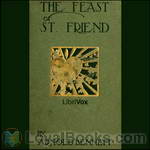 The Feast of St. Friend
The Feast of St. Friend
In The Feast of St. Friend, a Christmas book, Arnold Bennett shares his views on Christmas as the season of goodwill. As always, Bennett's writing includes some thought-provoking ideas liberally spiced with his wry sense of humour, and as always too, you can barely believe it was written so long ago. This was published exactly 100 years ago, in 1911. (Introduction by Ruth Golding) | |
 Hilda Lessways
Hilda Lessways
This book is the second in Bennett’s four books about life in the Five Towns (the real life Potteries in Staffordshire). It tells the story of Hilda before her marriage to Edwin Clayhanger (from the first book). Bennett explores Hilda's ambition to make a career for herself, her coming of age and her working experiences as a shorthand clerk and keeper of a lodging house in London and Brighton. He also shows her intensifying relationship with the enigmatic George Cannon that ends in her disastrous bigamous marriage and pregnancy, and finally her reconciliation with Edwin Clayhanger | |
 Clayhanger
Clayhanger
This first of a trilogy of novels is a coming-of-age story set in the Midlands of Victorian England, following Edwin Clayhanger as he leaves school, takes over the family business, and falls in love.The books are set in Bennett's usual setting of "the 5 Towns", a thinly-disguised version of the six towns of "the Potteries" which amalgamated (at the time of which Bennett was writing) into the borough (and later city) of Stoke-on-Trent.In one of the earlier chapters in the book, Bennett writes that... | |
 Buried Alive
Buried Alive
The hero is Mr Priam Farll, a painter of considerable ability. He is, however, extremely shy – so shy that when his valet, Henry Leek, dies suddenly, the doctor believes the dead man to be Priam Farll and the live man the valet. The artist does not try to disabuse him. After the funeral (in Westminster Abbey), Priam Farll marries a widow and lives a happy life until the loss of his wife’s money means he has to take up painting again. A connoisseur of art recognises his style but thinks the paintings are by an imposter... | |
 Pretty Lady
Pretty Lady
‘The Pretty Lady’ is considered to be one of Bennett's most revealing and under-rated works. It is the story of a French prostitute, Christine, who has escaped from wartime Ostend, and set herself up in business in London. Though a refugee, she demands no pity; she is self-sufficient, practical and realistic. Christine is not a harpy preying on innocent soldiers, but a canny businesswoman, doing the best she can with the opportunities life has given her. Her main relationship is with G.J. Hoape, a wealthy man above the military age... | |
 Ghost: A Modern Fantasy
Ghost: A Modern Fantasy
The novel opens with Carl Foster, a recently qualified doctor, coming to London to try and make his fortune. He meets a famous tenor, Signor Alresca, who suffers a dreadful injury backstage and Foster tends to him. He thus meets the lead soprano, Rosetta Rosa, and falls hopelessly in love with her.Alresca takes Foster under his wing and they travel to Alresca's home in Bruges. It is clear to Foster that Alresca has some strange obsession. Foster also notices a stranger who seems to be dogging his footsteps.Things take an even more sinister turn when Alresca inexplicably dies. . . | |
 Matador of the Five Towns and Other Stories
Matador of the Five Towns and Other Stories
Twenty-two short stories by Arnold Bennett, mainly set in the 'Five Towns', Bennett's name for the pottery manufacturing towns of the English midlands | |
 These Twain
These Twain
Hilda is saved from destitution by Edwin Clayhanger who marries her. The two, with Hilda's son by her disastrous 'marriage' to George Cannon, are living in Bursley. Edwin does not enjoy an entirely happy marriage with Hilda because of her outspokenness. Hilda has strong opinions on matters which at the time were considered to be a male preserve – for example, on Edwin’s business. She also does things without telling him. As a consequence, Edwin has his doubts about their marriage and is angered by his wife just as he had been by his father... | |
 Roll-Call
Roll-Call
"The Roll-Call" is the sequel to the Clayhanger trilogy. This book concerns the young life of Clayhanger's stepson, George. George Edwin Cannon (he quickly dropped the surname Clayhanger), is an architect, in many ways representing the ambitions held by his stepfather, Edwin. However, he possesses an arrogance endowed by family wealth and Bennett examines with some aplomb the difficulty of bringing up children without spoiling them. George eventually joins the army and this is a fitting finale to this fine series. | |
 How to Live on 24 Hours a Day (version 2)
How to Live on 24 Hours a Day (version 2)
Are you really 'living', or just existing? Do you want to improve yourself or just continue to muddle through? Do you use the time given you each day, or just throw most of it away? These questions Bennett asks each of us and for those who want to really live and learn, offers very valuable advice. Time is the most precious of commodities states Bennett in this book. Many books have been written on how to live on a certain amount of money each day. And he added that the old adage "time is money" understates the matter, as time can often produce money, but money cannot produce more time... | |
 Old Adam
Old Adam
Edward Henry Machin, whose rise from humble beginnings to prosperity was told in 'The Card', leads a comfortable life in the English Midlands 'Five Towns'. Yet when he unexpectedly gains three hundred and forty-one pounds in a speculation on rubber shares, he realises that he doesn't 'feel so jolly, after all'. After a visit to the local music hall, he decides that a change is in order. He takes the morning train to London, where adventures in the theatrical world await. 'The Old Adam' was also published under the title, 'The Regent'. | |
 Loot Of Cities
Loot Of Cities
Published in 1917, this is a collection of a novella and seven short stories by one of the cleverest authors of the early twentieth century. ‘In Queen's Quorum , a survey of crime fiction, Ellery Queen listed Bennett's The Loot of Cities among the 100 most important works in the genre. This collection of stories recounts the adventures of a millionaire who commits crimes to achieve his idealistic ends. Although it was "one of his least known works," it was nevertheless "of unusual interest, both as an example of Arnold Bennett's early work and as an early example of dilettante detectivism".’ - Summary by David Wales | |
 Elsie And The Child; A Tale Of Riceyman Steps And Other Stories
Elsie And The Child; A Tale Of Riceyman Steps And Other Stories
Thirteen short stories by a master story teller of the early twentieth century. His writings, fiction and nonfiction, were popular with the public. After contributions to the WWI war effort, he declined the Order of the British Empire . - Summary by David Wales. | |
 Lilian
Lilian
Lilian works in a typewriting office owned by Felix Grig, a middle-aged man of means. The office is run by his spinster sister, Miss Grig, who suspects that Felix is more interested in Lilian than perhaps he should be and gives Lilian the sack. Her plan fails as Felix invites Lilian to dinner – and the book follows the course of their evolving relationship. | |
 Clayhanger (Version 2)
Clayhanger (Version 2)
A coming-of-age story about Edwin Clayhanger, who leaves school, has his ambition to become an architect thwarted by his tyrannical father, Darius, and so works in the family printing business. Edwin eventually takes over the business successfully. The story follows Edwin’s relationships with his family and the mysterious Hilda Lessways. It is the first book of four in the Clayhanger series, following Edwin’s life. - Summary by Simon Evers | |
 Riceyman Steps
Riceyman Steps
Arnold Bennet's masterly novel is a gritty tale about a bookseller whose life and love of a woman are afflicted by miserliness. It is set in London's characterful Clerkenwell district shortly after the First World War. - Summary by Anthony Ogus | |
By: Arnold Kennedy (1853-1938) | |
|---|---|
 Merry Clappum Junction
Merry Clappum Junction
This is a jolly little book about a little boy, a dog, a train and a house. But not an ordinary train, oh no, and not an ordinary house either! And there are songs, too. The Preface is short, dull and only for the grown-ups. | |
By: Arthur Adams (1872-1936) | |
|---|---|
 Mrs. Pretty and The Premier
Mrs. Pretty and The Premier
The Premier has decided that being married would be good for his image. He asks his stenographer for advice: Good. Just jot me down a precis of the points made by your fifteen admirers when proposing - the points that specially appealed to you. I'm afraid, sir, that what most appealed to me could not be expressed in words. In fact, it wasn't words. But no, sir. The subject is too sacred.... ...But you could tell me how they began. The opening address, eh? How did they lead up? Most of 'em just kissed me, sir... | |
 Wasters
Wasters
Here we have a serious family drama by Australian playwright Arthur Adams about legacy and responsibilities, with some question about exactly who exactly the Wasters in society are. "No; you produce nothing, you spend everything; you do nothing, you waste everything. You're parasites, useless parasites.... Parasites, inefficients, wasters, wasters!" "We may be parasites, but you have made us parasites. We may be wasters, but you prey on us." To highlight the growing tensions, it includes comic second act scenes placed in the women's undergarment department of the family store... | |
 Galahad Jones
Galahad Jones
Dramatised by Australian playwright Arthur Adams from his book of the same name, this is labeled "A Comedy with a Tragic Tang". The author claims there is an alternative ending he wrote much against his will, but he declines to print it. - Summary by ToddHW Cast list: Galahad Jones: Adrian Stephens Sibyl Beach: Beth Thomas Pearl: Devorah Allen The Butcher: Son of the Exiles Edward Beach: ToddHW The Doctor: alanmapstone Kathie Jones: TJ Burns Horace Lothian: Tomas Peter A Young Man: Leanne Yau Em. Jones: Sonia Stage Directions: MichaelMaggs Edited by: ToddHW | |
By: Arthur Applin (1883-1949) | |
|---|---|
 Blackthorn Farm
Blackthorn Farm
But he was afraid. He had failed twice already. He could not afford to fail a third time. If he failed ruin faced him, and disgrace. His father had warned him that the money he had saved for his education had come to an end. Ruin for his father and his little sister! He had no idea how deeply Rupert was in debt. Rupert himself had only just realised it. And in desperation he had gambled to save himself. (Excerpt from 1st chapter by Arthur Applin) | |
By: Arthur B. Reeve | |
|---|---|
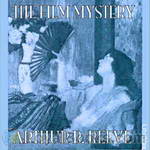 The Film Mystery
The Film Mystery
The Film Mystery is one of eighteen detective novels by Arthur B. Reeve starring his best known character Professor Craig Kennedy and his trusty sidekick Walter Jameson, a newspaper reporter. The pair bears an unmistakable resemblance to the more famous British master sleuth and his doctor friend. The setting of this mystery is the early days of movie making, and the murder victim is Stella Lamar, “the beautiful idol of the screen, beloved of millions”, who collapses and dies during the filming of a scene for her latest movie. | |
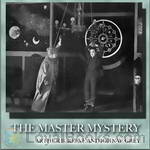 The Master Mystery
The Master Mystery
While Harry Houdini didn’t rise to fame as a screen actor, silent film makers of the day sought to capitalize on his fame. The Master Mystery was Houdini’s first such attempt, and it was embraced by the viewing public, leading to other screen roles following. The hero (or superhero) is Quentin Locke, scientist, agent of the U.S. Justice Department, and not surprisingly, an escape artist extraordinaire. The Master Mystery follows agent Locke through many pitfalls, in true serial fashion, as he... | |
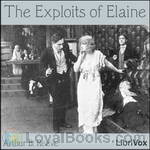 The Exploits Of Elaine
The Exploits Of Elaine
The Exploits of Elaine It tells the story of a young woman named Elaine who, with the help of a detective, tries to find the man, known only as “The Clutching Hand”, who murdered her father. (Wikipedia) | |
 The Silent Bullet
The Silent Bullet
The many adventures of Professor Craig Kennedy were chronicled by Arthur B. Reeve (October 15, 1880 - August 9, 1936). Reeve was an American mystery writer who created 82 Craig Kennedy mystery stories. The stories have a very Sherlock Holmes type feel, In fact Kennedy has been referred to as the "American Shelock Holmes". Along with his reporter friend, Walter Jameson, Kennedy solves many crimes and unveils mysteries using science. Each story features a facinating look at life in the early 20th century, and even includes some action along the way. | |
 Poisoned Pen
Poisoned Pen
The many adventures of Professor Craig Kennedy were chronicled by Arthur B. Reeve (October 15, 1880 - August 9, 1936). Reeve was an American mystery writer who created 82 Craig Kennedy mystery stories. The stories have a very Sherlock Holmes type feel, In fact Kennedy has been referred to as the "American Sherlock Holmes". Along with his reporter friend, Walter Jameson, Kennedy solves many crimes and unveils mysteries using science. This book contains twelve of Professor Kennedy's adventures. The interesting thing about these stories is Kennedy uses newly discovered science from his time period, which we take for granted today... | |
 Social Gangster
Social Gangster
This is a collection of 12 detective short stories by American fiction writer Arthur B. Reeve . What makes these stories so interesting is that each crime is solved with the Sherlock-Holmes-like clever deductions and scientific methods of Professor Craig Kennedy. - Summary by Sonia | |
By: Arthur Bingham Walkley (1855-1926) | |
|---|---|
 Pastiche and Prejudice
Pastiche and Prejudice
Arthur Bingham Walkley was an exceedingly popular critic, working as a drama critic at The Times alone for no less than 26 years, and writing for several other newspapers and privately besides that. This book of pastiches was completed after he already had more than two decades of work as a theatre critic under his belt, and it draws some brilliant characterisations. Among the literary and historical figures found in the different pastiches are such illustrious figures as Aristotle and Shakespeare, but also more modern phenomena as movies are discussed, along with politicians and other famous persons of the time. - Summary by Carolin | |
By: Arthur Bowie Chrisman (1889-1953) | |
|---|---|
 Shen of the Sea: A Book for Children
Shen of the Sea: A Book for Children
This book was awarded the John Newbery Medal by the Children’s Librarians’ Section of the American Library Association, for the most distinguished contribution to American Children’s literature during the year 1925. it is a collection of stories from China for children. - Summary by phil chenevert | |
By: Arthur Chapman (1873-1935) | |
|---|---|
 Rustlers, Beware!
Rustlers, Beware!
Cattle rustling had gotten out of control in northern Wyoming, so Asa Swingley is tasked with assembling a host of men to tend to the matter using whatever means necessary. He selects Milt Bertram to be one of his lead assistants, but Bertram becomes sidelined during the trip from Texas, which causes him to grow suspicious of the true nature of this expedition. What ensues leads Bertram to better understand his possible conflict of interest and what he must do to set matters straight. - Summary by Roger Melin | |
By: Arthur Conan Doyle (1859-1930) | |
|---|---|
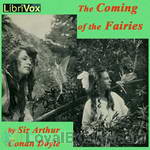 The Coming of the Fairies
The Coming of the Fairies
After a number of deaths in his close family, Sir Arthur Conan Doyle turned to spiritualism in hope of finding proof of the afterlife. Being open in this way, he wanted to believe that spirits and other supernatural being including fairies were real. Because of this he believed the photographs of fairies taken by the Cottingley girls were proof of the existence of such beings. In this book he presents his stance on the issue. Eventually it was proven that the photographs were indeed a hoax. | |
By: Arthur Empey | |
|---|---|
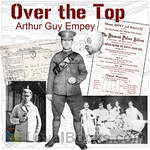 Over the Top
Over the Top
Arthur Guy Empey was an American who responded to the sinking of the Lusitania by enlisting with the British Army to fight in France. His experiences in the trenches, including his ultimate wounding and convalescence, became this book. When published in 1917, it was a major hit and helped the recruiting effort when America entered the Great War. If you’ve heard of the horror of trench warfare in WWI and want to see it from below dirt level, Empey offers it all here. Also included is Empey’s popular “Tommy’s Dictionary of the Trenches” which humorously demistifies the slang used by the British soldier. | |